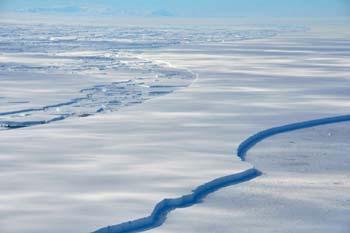Source: Xinhua
01-22-2009 10:08
BEIJING, Jan. 22 (Xinhuanet) -- Antarctica is getting warmer over the past half-century with the rest of the world, according to a new study published in Thursday's issue of the journal Nature.
 |
| The Wilkins Ice Shelf off the Antarctic Peninsula is seen breaking up January 18, 2009. The huge Antarctic ice shelf is on the brink of collapse with just a sliver of ice holding it in place, the latest victim of global warming that is altering maps of the frozen continent.(Xinhua/Reuters Photo) |
A review by U.S. scientists of satellite and weather records for Antarctica, which contains 90 percent of the world's ice and would raise world sea levels if it thaws, showed that freezing temperatures had risen by about 0.5 Celsius (0.8 Fahrenheit) since the 1950s.
The scientists concluded that the eastern region of the continent, which is larger and colder than the western portion, is warming at 0.1 Celsius per decade, and the west at 0.17 Celsius per decade -- faster than the global average.
"The thing you hear all the time is that Antarctica is cooling and that's not the case," said study lead author Eric Steig of the University of Washington.
For years, Antarctica was the only place that had oddly seemed immune from climate change. Temperatures on much of the continent at the bottom of the world were staying the same or slightly cooling, previous research indicated.
The findings may help puncture arguments by global-warming skeptics such as the late author Michael Crichton who have pointed to cooling in parts of Antarctica as an indicator that climate change is exaggerated.
The scientists also wrote that the trend is "difficult to explain" without the effect of rising greenhouse gas levels in the atmosphere.
Editor:Yang Jie
